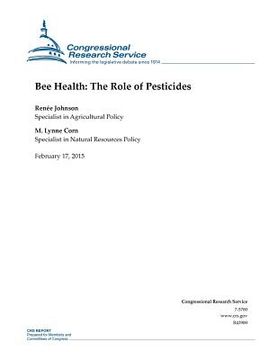Reseña del libro "Bee Health: The Role of Pesticides (en Inglés)"
Over the past few decades there has been heightened concern about the plight of honey bees as well as other bee species. Given the importance of honey bees and other bee species to food production, many have expressed concern about whether a "pollinator crisis" has been occurring in recent decades. Although honey bee colony losses due to bee pests, parasites, pathogens, and disease are not uncommon, there is the perception that bee health has been declining more rapidly than in prior years, both in the United States and globally. This situation gained increased attention in 2006 as some commercial beekeepers began reporting sharp declines in their honey bee colonies. Because of the severity and unusual circumstances of these colony declines, scientists named this phenomenon colony collapse disorder (CCD). Since then, honey bee colonies have continued to dwindle each year, for reasons not solely attributable to CCD. The U.S. Department of Agriculture (USDA) reports that CCD may not be the only or even the major cause of bee colony losses in recent years. In the United States, USDA estimates of overwinter colony losses from all causes have averaged nearly 30% annually since 2006. The precise reasons for honey bee losses are not yet known. USDA and most scientists working on the subject seem to agree that no research conclusively points to one single cause for the large number of honey bee deaths. This general conclusion was reconfirmed in a 2013 joint report by USDA and the U.S. Environmental Protection Agency (EPA). Reasons cited for bee declines include a wide range of possible factors thought to be negatively affecting pollinator species. However, one issue widely noted is the role that pesticides-in particular, neonicotinoid pesticides-might play in overall bee health. Pesticides are the focus of this report. Pesticides are among many identified factors known to affect bee health, including pests and diseases, diet and nutrition, genetics, habitat loss and other environmental stressors, and beekeeping management issues, as well as the possibility that bees are being negatively affected by cumulative, multiple exposures and/or the interactive effects of several of these factors. The focus of this report on bee exposure to pesticides is not intended to imply that pesticides are any more important in influencing the health and wellness of bees than other identified factors influencing bee health. Pesticides are one of many influences on bee health. The current state of knowledge on pesticides and bee health is summarized in the USDA-EPA report: it is not clear, based on current research, whether pesticide exposure is a major factor associated with U.S. honey bee health declines in general, or specifically affects production of honey or delivery of pollination services. It is clear, however, that in some instances honey bee colonies can be severely harmed by exposure to high doses of insecticides when these compounds are used on crops, or via drift onto flowers in areas adjacent to crops that are attractive to bees.

